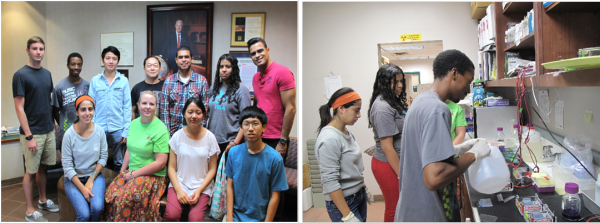Undergraduate research:

We welcome motivated undergraduate students to join us to dissect plant immune signaling. We have designed two genetic screens (aggie-luc and bak-to-life) specifically tailored for undergraduate students.
Understand immune signal integration by a “aggie-luc” screen
All living organisms must integrate and disseminate environmental signals to generate appropriate cellular responses. The molecular mechanisms by which signal integration is achieved remain— in many biological systems— obscure. Defense response system provides a superb model for illuminating insight into this issue. Without specialized immune cells, the sessile plants have evolved a large set of cell-surface immune sensors to detect the microbial presence by recognizing evolutionarily conserved microbe-associated molecular patterns (MAMPs). Recognition of MAMPs initiates complex signaling cascades cumulating robust defense responses accompanied with rapid global transcriptional reprogramming. We have initiated a genetic screen with Arabidopsis transgenic plants carrying an early and specific immune responsive marker gene FRK1 promoter fused with a luciferase (LUC) reporter and identified a series of mutants named Arabidopsis genes governing immune gene expression (aggie). We use an integrative genetic, biochemical, cellular, and computational approach to understand how different AGGIE genes integrate multiple signaling pathways to ensure a prompt, robust and long-lasting plant immune response.
Keep immunity from running amok by a “bak to life” screen
Maintaining active growth and effective immune response is often costly for a living organism to survive. The uncontrolled defense activation is often detrimental tothe hosts, and potentially leads to massive cell death. The depletion of a key immune regulator BAK1 in model plant Arabidopsis leads to spontaneous cell death with extensive defense activation. We have developed a RNA interference (RNAi)-based genetic screen for suppressors of BAK1-mediated cell death. Mutants that suppress BAK1-mediated cell death are named “bak to life” (btl). The research team will isolate and characterize these btl mutants genetically and biochemically. Understanding defense and cell death control is essential for the survival of all organisms.
Students can register for BICH/GENE491 for research credit, or apply for the Aggie Research Program, Department of Biochemistry and Biophysics REU Program, or the ASPB Summer Undergraduate Research Fellowship (SURF).

Summer Green Immunology Workshop:
We offer a one-week Green Immunology Summer Course sponsored by NSF. The aim of this summer minicamp is to provide research and education opportunities for motivated undergraduate students, particular students from Hispanic Serving Institutions in the Texas Rio Grande Valley.


High school students:
We also welcome high school students to join our lab for research experience. For information on how to apply, please contact Dr. Ping He.

